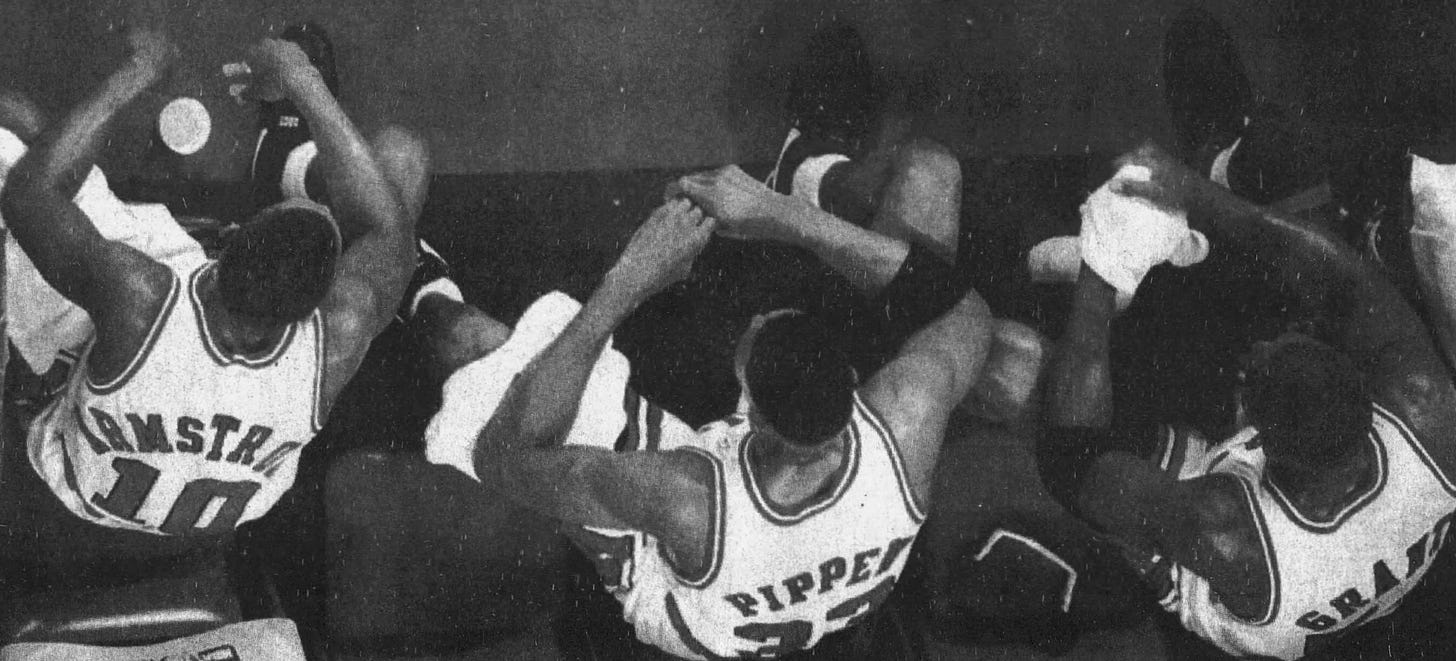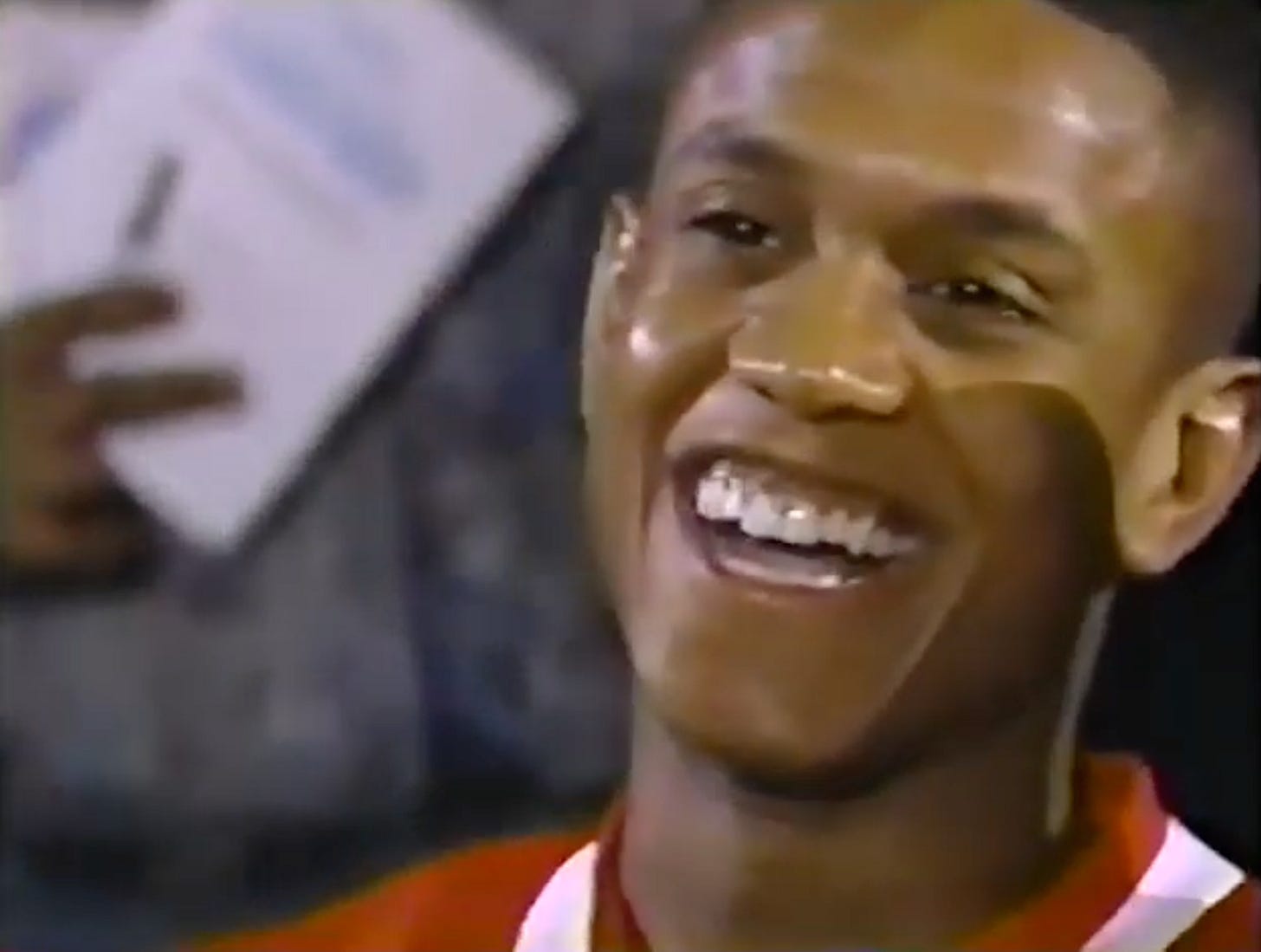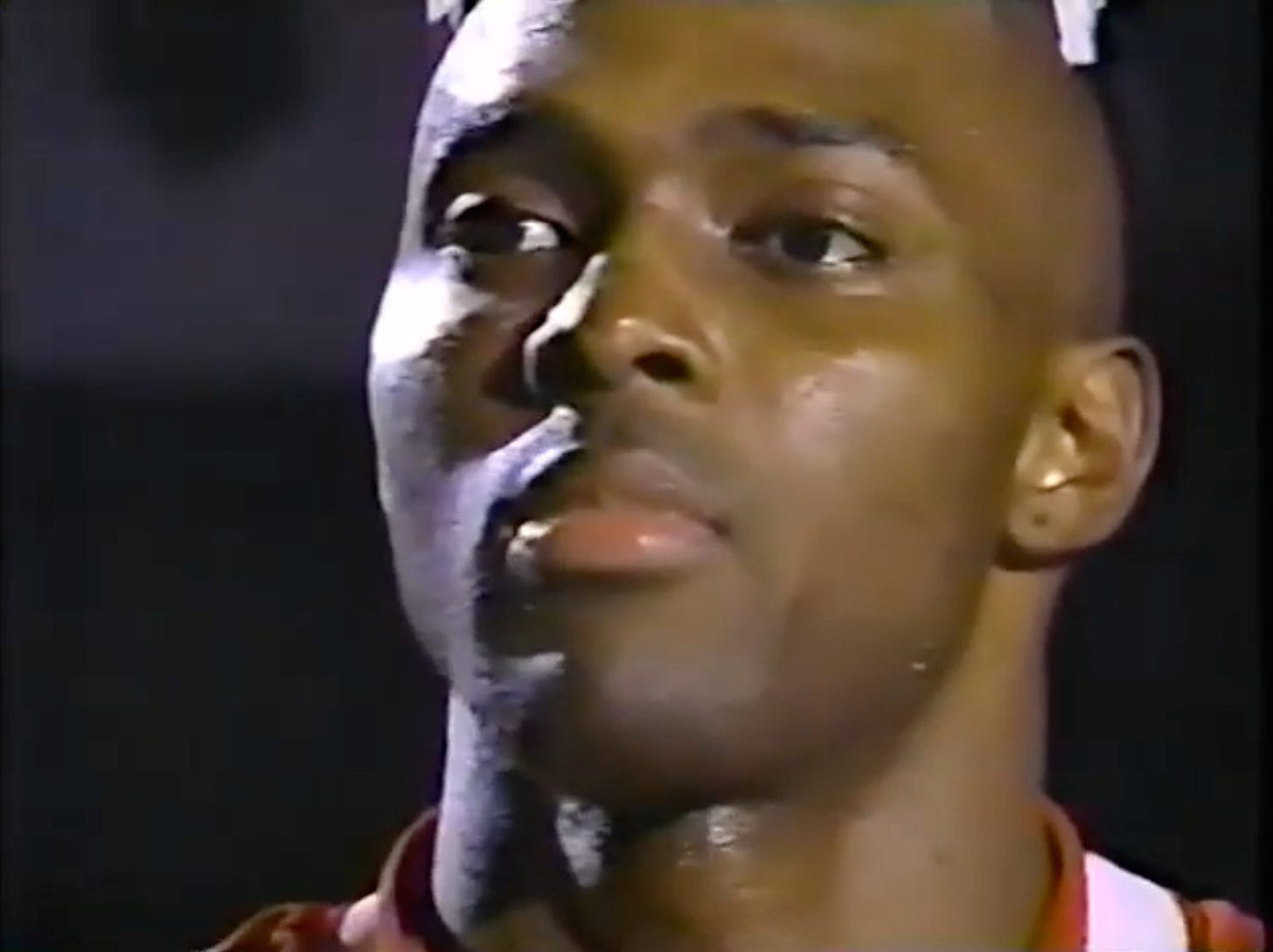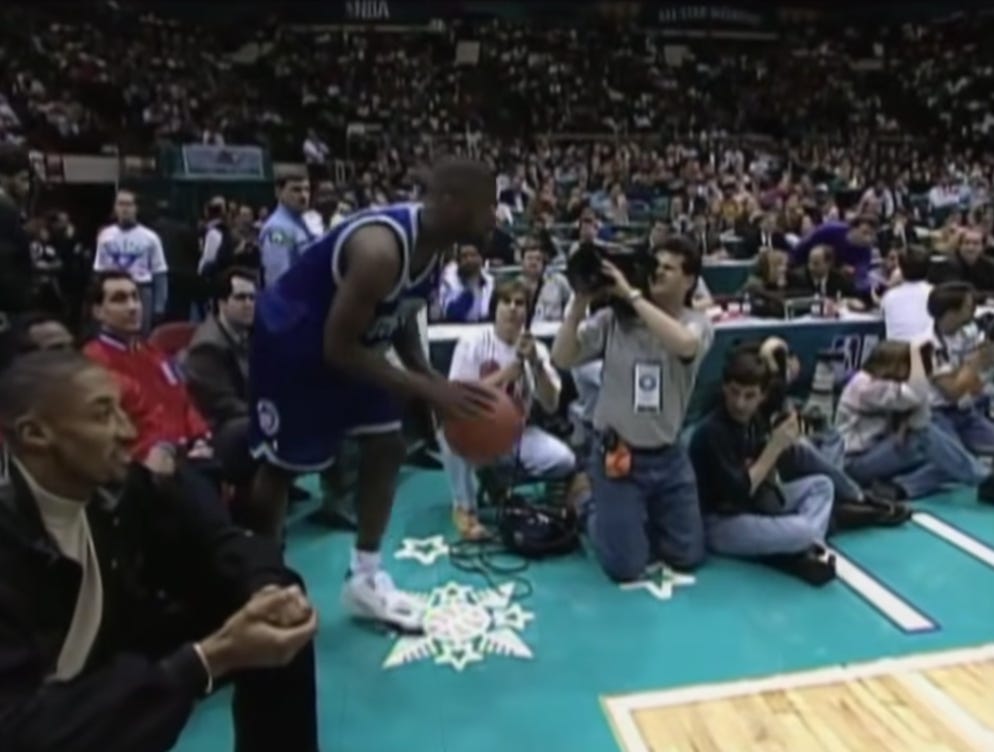Scottie, B.J. & Horace: the story of our three 1994 All-Stars
How B.J. Armstrong and Horace Grant broke out in '94.

“Without Michael, it’s going to be hard. But once we step on that floor, we’re still going to have that same cocky attitude that, hey, we’re going to win this ballgame.”
— Horace Grant, two days after Michael Jordan’s retirement before the 1993-94 season
I never lost hope. The Bulls players and coaches never lost hope.
I can’t speak for anyone else.
When Michael Jordan shocked literally the world (not hyperbole) with his retirement one month before the 1993-94 season, the conventional wisdom wasn’t simply that a shot at a four-peat was gone. Folks were acting like Chicago’s hoops apocalypse was nigh. Vegas bookmakers dropped the Bulls from 2-1 favorites to win the 1994 championship down to anywhere from 10-1 to 25-1.
At home, the Tribune’s season preview saw four writers picking the Bulls to win between 41 and 44 games, with Bernie Lincicome picking them at 41-41 with this hopeless declaration:
“The Bulls without Michael Jordan are the Los Angeles Clippers, and the Clippers were 41-41 last year.”
In that same NBA preview issue, the Trib incredibly published a sidebar called “Top 10 Reasons for Still Going to Bulls Games.” This was a team on a consecutive sellout streak since November 21, 1987, a fact that did not elude the writers of this list1, which ended with their number one reason: “Hey, this is Chicago. We stick by our teams. Don’t we?”
Those of us who did were given one of the greatest sports experiences of our lives.
It certainly was one of the greatest seasons of B.J. Armstrong’s and Horace Grant’s lives. When fans today reflect on the remarkable 1994 Bulls season, perhaps the first stat that comes up is wins: in 1994, the Bulls won 55 games, just two fewer than the three-peat Bulls won the year before. That ‘93 team was a club in decline (only compared to 1991 and 1992, of course) while the ‘94 team was reborn with a revamped bench starring second three-peat mainstays Luc Longley, Toni Kukoc, Steve Kerr and Bill Wennington.
“With Michael here, a lot of us were really taken out of the picture,” Pippen said in December. “But now, everything in the locker room is shared. … We’re all accepting the losses and we’re all enjoying the victories. There’s no headlines saying, ‘Pippen does this and Bulls win.’ We’re all enjoying being able to celebrate what we’re doing.”
Of the newcomers, Kukoc had the biggest impact, hitting three huge game-winners in the regular season and becoming the team’s first double-figures scorer off the bench since Craig Hodges in 1989. But the big story of the 1994 Bulls was the ascension of their three biggest returning stars.
Pippen went from All-Star starter to MVP candidate.
Grant went from unheralded role player to All-Star reserve and free agent superstar.
Armstrong went from “the other starting guard” on the Bulls to “the first starting guard” on the Eastern Conference All-Stars.
Horace’s first All-Star selection had been building up since 1992. B.J.’s selection was a surprise but reflected his immense popularity, ranging from the teen readers of Seventeen magazine to basketball fans in Belgium. This is the story of how the Bulls ended up with three NBA All-Stars for the first and only time in their history2.

B.J. Armstrong in ‘94: The Kid graduates
B.J. Armstrong always stood out.
From his rookie season of 1990 through the end of the first three-peat, the 6’2 Armstrong built himself into a consistent presence on a championship team, working his way from the team’s fourth guard to its sixth man to the starting point guard next to Michael Jordan. Making him even more memorable was his youthful demeanor on an already young team; I specifically remember my father saying during a Bulls game in B.J.’s rookie year, “Doesn’t that kid have homework?”
After the double jackpot of Scottie Pippen and Horace Grant in 1987, Jerry Krause brought in a wave of rookies who seemed poised to battle for a starting job. But the only one who ever truly overtook a starter was Armstrong, who Phil Jackson promoted in 1992-93. Deadly from deep, Armstrong shot a hair under 50% from the floor but led the NBA in three-point percentage at .453, then the 9th best mark of all-time3.
This was the era of fan-only voting for starters. Yes, B.J. was having a terrific season, but so were Mark Price, Reggie Miller and rookie Anfernee Hardaway. At the time, I chalked up his election to NBA fan muscle memory, simply electing a Bulls guard. I do think that was part of it. But there were three other factors at play:
1. The Bulls shocking record
I guess I didn’t think as much about this at the time, since I viewed the fan vote as largely an act of popularity, one that generally aligned with talent and production but fell back on popularity nonetheless, but the fact that the Bulls were so much better than anticipated likely influenced some fans to think, “Someone’s responsible for their great record without Jordan and it can’t only be Pippen.”
After starting 4-6 and seemingly proving the doubters right, the Bulls straightened up and soared. By the end of December, Phil Jackson and the Bulls staff were in line to coach the East All-Stars, as they had the second best record after the Knicks, and Knicks coach Pat Riley was ineligible due to his own “Riley Rule” which precluded a head coach from coaching the All-Star Game in consecutive seasons.
Atlanta’s Lenny Wilkens ended up coaching the East when the Hawks took a half-game lead over the Bulls at the end of January, when the coaching jobs locked in, but by the time of the actual All-Star Game, the Bulls and Hawks were tied at 34-13, a half-game behind the Knicks. For its NBA midseason report, one California newspaper gave the Bulls the best grade in the league, an A+, writing, “The Bulls don’t have the depth of talent of the Knicks and Hawks, but they have a depth of winners. So far, that’s been enough.”
2. The dearth of Eastern Conference guards
Sometimes it’s you. Sometimes it’s the ballot.
In 1994, for B.J. Armstrong, an All-Star selection was a combination. Due to injuries, age, retirement and even a pair of tragic deaths, the pool of Eastern Conference guards was vastly transformed from 1993 to 1994. Explained Magic GM Pat Williams:
“Isiah is coming to the end and Dumars has not had a good year. You lose Petrovic and Lewis4 — two of the best guards in the conference — with Michael retired, and you’d say Price and Reggie Miller have been there, but who else?”
B.J. wasn’t the only surprise Eastern Conference guard. Despite not having an All-Star since 1985 and being only 18-21 when voting ended, the New Jersey Nets matched the Bulls with two starters: guard Kenny Anderson and forward Derrick Coleman. Unlike Armstrong, Kenny Anderson had finished in the top 10 in voting previously, in 1992. Like Armstrong, 1994 was Anderson’s only All-Star appearance. The East’s starting guards in 1995 were Penny Hardaway and Reggie Miller, and then Penny and MJ held the starting jobs from 1996 to 1998.
Considering MJ and Isiah were the East guards’ leading vote-getters from 1988 to 1993, it’s fair to say that 1994 was a true outlier.
3. B.J.’s popularity
B.J.’s election wasn’t just about replacing one Bulls guard with another, honoring the “other” players on a surprise first-place team or the lack of East guards. B.J. had a popularity all his own. He was massively visible: a young, fast, sweet-shooting playmaker on the most famous sports team in the world, Armstrong missed only one game in his six seasons on the Bulls, way back in his rookie year.
When you tuned into a Bulls game, #10 was one of the players you were guaranteed to see.
That visibility likely spurred his rapid rise to the All-Star Game. B.J. wasn’t just popular among East guards. At just over 529,000 votes, he trailed only reigning MVP Charles Barkley (794,000+ votes) and Shaq (603,000+) for most votes in the NBA.
“B.J. is really popular,” Phil Jackson explained in January, just before starters were announced. “I noticed in Seventeen magazine a couple of years ago, he played big. On the road, there’s a section of adoring young fans who are voters in All-Star games, so I know there’s appeal there.”
While I can see Phil making that Seventeen comment tongue-in-cheek, B.J.’s popularity was real, as he learned during All-Star weekend from a Belgian television crew who told him that he was the most popular NBA player in Belgium.
“I can’t really speak about popularity. It just happens,” Armstrong said. “I haven’t changed what I do at all — people just see me where Michael used to be.”

Horace Grant finally gets his due
Heading into the 1994 season, no one would have predicted B.J. Armstrong to be an All-Star. That’s not the case for Horace Grant.
One of the most famous stories about the fraying of the first three-peat Bulls came from 1992-93 training camp, when Horace took exception to Phil giving Michael and Scottie breaks from practice to rest after the Olympics. Grant and Pippen had entered the NBA together and were best friends, forming the lower two parts of a team triangle with Jordan on top.
But by 1993, the triangle had turned upside down, with Jordan and Pippen on top and the third point, Grant, alone at the bottom. As championship seasons go, Grant’s were filled with team success but also personal frustration, especially at All-Star time. In 1992, while Pippen made the team for the second time, Grant was left out.
“I’m going to wear a plaid jacket to our next home game, like Rodney Dangerfield, to show I don’t get no respect,” he said after he was not chosen as a reserve. Even injuries to East forwards Larry Bird and Dominique Wilkins didn’t help Grant, as guard Michael Adams was chosen to replace Bird and forward Kevin Willis subbed in for his Hawks teammate Dominique.
Bird’s injury did help Pippen, though, who was chosen to replace Bird in the East’s starting lineup. Pippen had been named a member of the Dream Team in September of 1991, was a first-time All-Star starter and a first-time All-NBA team member (2nd team, no less), and was elevated on the All-Defensive team, going from 2nd team in 1991 to 1st team in 1992.
And just like that, the Bulls had two Olympians / All-NBA / All-Defensive first teamers / All-Star starters… plus Horace Grant.
In 1993, out of either realism or diplomacy, Grant predicted he would not make the All-Star team. “I don’t feel I deserve it this year even though I don’t feel I’ve had a bad year,” Grant, who had finished fourth in voting for East forwards, said just before the reserves were announced. “So I’m not going to be disappointed like I was last year.”
Grant did indeed have a down year offensively, shooting 51% from the floor after shooting 58% in 1992. Still, he was getting his respect in league circles. In its February 1993 issue, the staff at Inside Sports5 polled 12 NBA experts for their best players by position. Grant ranked fourth among power forwards, behind runaway leaders Karl Malone and Charles Barkley and in the clear 3-5 slots, three votes behind Detroit’s Dennis Rodman and one vote ahead of New Jersey’s Derrick Coleman6.
When the Bulls did not extend Grant before the 1994 season started, Grant declared that he would test the free agent waters after the season as an unrestricted free agent. Between the MJ vacuum in the offense, Scottie’s early season injury, playing in a contract year and chasing a $50,000 contract bonus for making the All-Star team, Grant asserted himself. He started his season with 22 points and a last-second game-winning tip-in for a 124-123 overtime win over the Hornets, and took his longstanding All-Star push to a new level in mid-December in a 108-98 Bulls road win over the Celtics, setting career highs in points (31), field goals (15) and field goal attempts (22), marks that would remain his career highs.
“I’m playing my best basketball since I’ve been in the league,” Grant said after the game. “I’m playing relaxed, I’m playing hard and I’m getting more opportunities.”
Sam Smith noticed: he chose Grant as an All-Star starter next to Pippen, Price, Miller and Ewing, with B.J. as a reserve.
The fans felt differently. Grant barely registered on the All-Star voting, dipping into the 10th slot in late January only to dip back out and finish outside the top 10.
“I’d be a little disappointed if I didn’t make it, but I’ll just go to Las Vegas and have some fun,” Grant said after the voting ended.
Fortunately, the Eastern Conference coaches agreed more with Sam than the fans. On February 1, 1994, the East coaches voted Grant to his first — and only — All-Star Game.
“If Jerry Krause’s leg was long enough, he’d be kicking himself right now,” a victorious Grant said. “It seems like everything is falling into place for me. I’m becoming an unrestricted free agent and I made the All-Star team, so the price definitely went up. I would be cheating myself if I didn’t go out there and test the market. And I’m not going to cheat myself.”

The Bulls dominate All-Star weekend
There were complaints. There always are. In Ohio, fans and writers wondered how B.J. Armstrong beat out Mark Price for a starting spot. In Indiana, Reggie Miller received that defense. In Florida, the clamoring was for rookie Penny Hardaway, with one paper running a page-length headline: “For starters, Armstrong a weak All-Star pick.”
Fortunately, “deserve got nothing to do with it.” When the game began, B.J. showed he belonged, scoring 11 points on 5-9 shooting, one of five members of the East in double figures.
Leading all scorers was Pippen with 29 points on 5-9 from three, grabbing 11 boards, swiping four steals and ending the night with game MVP. Horace had a tough shooting night but pulled down eight rebounds and blocked two shots in the East’s 127-118 win. Even without Phil as head coach, the three Bulls got to play together, with Lenny Wilkens running a lineup late in the 1st half of Armstrong, Kenny Anderson, Pippen, Grant and Shaq.
It was part of a dominant showing for the Bulls all weekend long. B.J. and Steve Kerr competed in the Long Distance Shootout, with B.J. losing in the first of three rounds but Kerr advancing to the semis, the first of his four straight competitions, ending with his victory in 1997.
And in the NBA’s first year of the rookie game, which replaced the old-timers’ game, Toni Kukoc scored 14 points on a scintillating 6-8 shooting as the “Phenoms” defeated the “Sensations” 74-68. The all-around performance from the Bulls showed just how powerful MJ’s “supporting cast” could be, and how important Krause’s new additions were to the club in its pursuit of a four-peat.
“Pete Myers put it well,” Grant said in February. “He said since Michael retired, it seems like the flowers in the garden are starting to bloom.”

The harvest was lush. Scottie finished 3rd in the MVP voting, 4th for DPOY and joined Hakeem Olajuwon as the only players in ‘94 who were 1st team for both All-NBA and All-Defensive. Horace was 2nd team All-Defensive again and received DPOY votes. B.J. received one vote for 1st team All-NBA.
Most importantly, the Bulls entered the final weekend of the season with a shot at the #1 seed in the East, ultimately finishing two games behind the #1 seed Heat and the #2 seed Knicks. They swept the Cavaliers and pushed the favored Knicks to seven games before finally getting eliminated in the playoffs for the first time since 1990.
That was Scottie’s infamous migraine game. This time, the Bulls fell as valiant heroes (though not without controversy). And they did it with an MVP candidate flanked by two All-Star teammates, everyone sharing the bounty. By winning a three-peat and reaching Game 7 of the second round, the 1994 Bulls are, to this day, the closest any team has gotten to a four-peat since Russell’s Celtics.
“They will always be Chicago’s greatest sports team,” that old sourpuss Lincicome wrote after it was all over. “They crossed generations and cultures, neighborhoods and agendas. They brought a common joy and a shared memory. … What a time it was.”
“Un-4-gettable run is done” declared the Tribune, and perhaps that was the greatest tribute to Scottie, to Horace, to B.J. and Bill and Pax and Tank: that this team lost the greatest player the game had ever seen and was considered a continuation, not a cut-off. They were written off without MJ, but like Geno Smith said, they didn’t write back. Their victors honored them as defending champions to be de-throned even though the king had left the kingdom.
Three all-stars and 55 wins later, the Bulls were champions until they weren’t.
The way it should be.

-
-
-
More on the 1994 Bulls:
My salute to the ‘94 Bulls, from 2005.
My comprehensive Twitter thread on the historic and mind-blowing Bulls-Knicks series.
My breakdown of how Phil Jackson and Jerry Krause rebuilt “the totem pole,” from my 1996 Bulls book, free to read and download here.
Neil Paine’s excellent analysis from 2010: “How the 1994 Chicago Bulls won 55 games without MJ.”
The rest of the list: 10. Easier to park. 9. Monitor progress on new United Center across the street. 8. Watch Jerry Krause jump up and down every time Toni Kukoc scores. 7. See if any Bulls resumes dusting Johnny Kerr with resin. 6. See what politicians Jerry Reinsdorf has as guests. 5. Watch how many times revolving, courtside advertising signs fail to stay in sync. 4. Might get picked for the million-dollar shot contest. 3. See if Tom Cruise, Spike Lee, Jack Nicholson, Jack Kemp or Madonna ever comes to another game. 2. Say you were there when the Bulls’ consecutive sellout streak ends.
After Horace was added as an East reserve, Sam Smith wrote that the Bulls had three All-Stars for the first time since 1973 with Chet Walker, Bob Love and Norm Van Lier. But I can’t find any evidence that Van Lier played in that game. So for now, I’m going to say that 1994 is the only year that the Bulls had three All-Stars.
The top 10 after 1993: Jon Sunvold, .522, 1989 Heat; Steve Kerr, .507, 1990 Cavaliers; Craig Hodges, .491, 1988 Bucks/Suns; Mark Price, .486, 1988 Cavaliers; Kiki Vandeweghe, .481, 1987 Trail Blazers; Craig Hodges, .481, 1990 Bulls; Jim Les, .461, 1991 Kings; Drazen Petrovic, .496, 1990 Trail Blazers; B.J. ARMSTRONG, .453, 1993 Bulls; Chris Mullin, .451, 1993 Warriors. Today, Armstrong’s 1993 ranks 77th.
In 1993, Reggie Lewis finished 6th in voting among East guards while Drazen Petrovic finished 8th. In what turned into a tragic and tumultuous summer in the NBA, Petro died June 7 in a car wreck while Lewis died July 27 of a heart attack.
Issue courtesy of mj23covers.
The starting five: John Stockton (56/60 points), Michael Jordan (60), Scottie Pippen (44), Karl Malone (57) and David Robinson (53). Because he got votes at both SF and PF, Charles Barkley finished with 53 points but was second to Malone at PF.





